6
SHE TOOK THE CLAM HAT OFF and tossed it into a corner of the sofa, where it lay there watching us, wide-eyed, amused.
“Denny,” she said. “Another thing not to be believed—that I went out with a guy named Denny. You know, on many occasions I have sat here, right here, on this sofa, alone, and asked myself why I did some of the things I did. For example, why I allowed myself to be made ridiculous—wearing that stupid hat. And why I threw myself at a guy named Denny.”
She looked at me as if she expected me to have the answer. I didn’t. I could see, though, that she had been asking herself questions for a long time. I think that the discovery of the origin of her name—all those years earlier—had done something to her. It had got her to thinking. And from then on she was questioning, always questioning, puzzling, thinking, searching, ever since then. It had made her ask why about the past and what if about the future.
“Well? What do you think?” she asked.
“I don’t know. I—”
“Haven’t thought about it, huh? Well, I have.”
She grew serious. I had the feeling that the entire discussion was about to get serious, that we were about to stop chatting and start getting to the point.
“I have to tell you something about myself at that time, Peter,” she said. “I had a certain reputation.”
“I never paid much attention—”
“Oh, cut it out. You don’t have to be kind. My reputation was deserved. Not at first. You know—I have to say that. Not at first. My reputation preceded the facts. As soon as I started developing, everyone assumed that I was—easy. ‘Easy.’ Remember that?”
“Well—”
“Sure you do. Even my parents thought I was! The boys I brought home terrified my parents. I didn’t realize it at the time, of course. I realize it now. I guess it was the kind of guy I was interested in, but, I mean, it’s not as if I was only attracted to boys for their looks. Personality was important, too.”
“Yeah, but personality is an overrated quality, often nothing more than a set of attitudes, something rigid, a crust.”
“You know what? I agree with you. But I wouldn’t have then. And actually that was to my benefit. It was because I accepted the notion that I ought to be looking for a guy with a nice personality that I always found it easy to avoid the worst sort of boy, found it perfectly natural to do so, even in high school, when I was still so eager to please all the boys. My parents, though! My parents were so worried. I could see just how worried they were whenever I brought a boy home. I could even see exactly why they were worried, because whenever I brought a boy home to endure the ritual introduction, at some point my parents’ eyes would stray to his crotch. The first time I witnessed this inspection, I was shocked. I mean shocked. Later I found it hilarious. They couldn’t help betraying themselves. I watched for it—that shift of the eyes—and I spotted it every time. The boy would be trying to think of something to say and my parents would be staring at his crotch. It didn’t take long for me to pick up the habit myself, and in the minds of the Babbington boys that habit became part of the personality of Tootsie Koochikov.”
“Like a crust.”
“Yup. Can’t see through it. Opaque. Hard. Anyway—not long after I discovered Corinne’s I began leaving with customers at the end of the night.”
“You would walk out into the dark, and between the looming bulk of the warehouses you could see, reflected on the bay, the beaded arc of the lights on the bridge—”
“Or, along the water’s edge, the rippling reflection of lights in a few houses where insomniacs sat up worrying—”
“—about their jobs or daughters—”
“—and also, here and there, the street lamps on roads that ended at the bay—”
“—and you could hear, if you stopped walking for a moment—”
“—for a kiss, a rough embrace, a quick feel—”
“—the lapping of the water against the bulkheads, or the rattle of the gravel beneath my shifting feet.”
“Your shifting feet?”
“If I happened to be there. And sometimes I was. There were nights—”
“—when I’d get into some car or another—”
“Maybe a yellow convertible, or an old coupe chopped and channeled and tucked and rolled. Of course, I was still years away from being able to drive.”
“I would let myself be driven off to somewhere—anywhere. I didn’t care. Anywhere but home.”
“I’ll bet the boys enjoyed you.”
“Yes, the boys—and the men, Peter—enjoyed me very much. Man and boy they wanted me, really wanted me. There was an odd dance that went on between the sexes back then, and I was very good at that dance. I never had to give them more than I was ready or willing to give. The ones who wanted me so desperately were easily controlled, since they wanted me to like them, and the ones who thought too much of themselves, thought that they had a right of some kind to what I had to give them, were—lucky coincidence—the ones to whom I was most willing to give whatever they wanted. How marvelous that matters should be so nicely arranged, all part of the clever plan of life. They all wanted me to give them what they wanted, but they wanted it so much that they were willing to settle for what I was willing to give them. I’m not sure how many people still know the steps to that dance now. They did enjoy me, though. How they did enjoy me. I was enjoyed all over town—in any number of cars on the town dock or right in the parking lot at Corinne’s, in a bedroom over the nautical supply store on the corner of Main Street and River Road, in the storeroom of the market on Main Street, in the cabin of a clam boat, aboard any number of handsome cruisers, in the ‘office’ behind the bar at Corinne’s, by Panama Red himself, on sofas in the living rooms of comfortable houses, when the ladies of the houses were away, and—”
“Enough.”
“Yes. Enough. One morning, I woke up beside some guy that I hardly recognized. I stared at him while he lay there, snoring, and I had the sudden feeling, really kind of a shocking revelation, that he meant absolutely nothing to me. I looked out the window. I was in a room, some room, somewhere, and for a moment I didn’t even know where I was, and in that moment, while I was trying to get my bearings, I realized that I had become Tootsie Koochikov—the town slut.”
[to be continued]
Have you missed an episode or two or several?
You can begin reading at the beginning or you can catch up by visiting the archive or consulting the index to the Topical Guide. The Substack serialization of Little Follies begins here; Herb ’n’ Lorna begins here; Reservations Recommended begins here; Where Do You Stop? begins here; What a Piece of Work I Am begins here.
You can listen to the episodes on the Personal History podcast. Begin at the beginning or scroll through the episodes to find what you’ve missed. The Substack podcast reading of Little Follies begins here; Herb ’n’ Lorna begins here; Reservations Recommended begins here; Where Do You Stop? begins here; What a Piece of Work I Am begins here.
You can listen to “My Mother Takes a Tumble” and “Do Clams Bite?” complete and uninterrupted as audiobooks through YouTube.
You can ensure that you never miss a future issue by getting a free subscription. (You can help support the work by choosing a paid subscription instead.)
At Apple Books you can download free eBooks of Little Follies, Herb ’n’ Lorna, Reservations Recommended, and Where Do You Stop?
You’ll find overviews of the entire work in An Introduction to The Personal History, Adventures, Experiences & Observations of Peter Leroy (a pdf document), The Origin Story (here on substack), Between the Lines (a video, here on Substack), and at Encyclopedia.com.




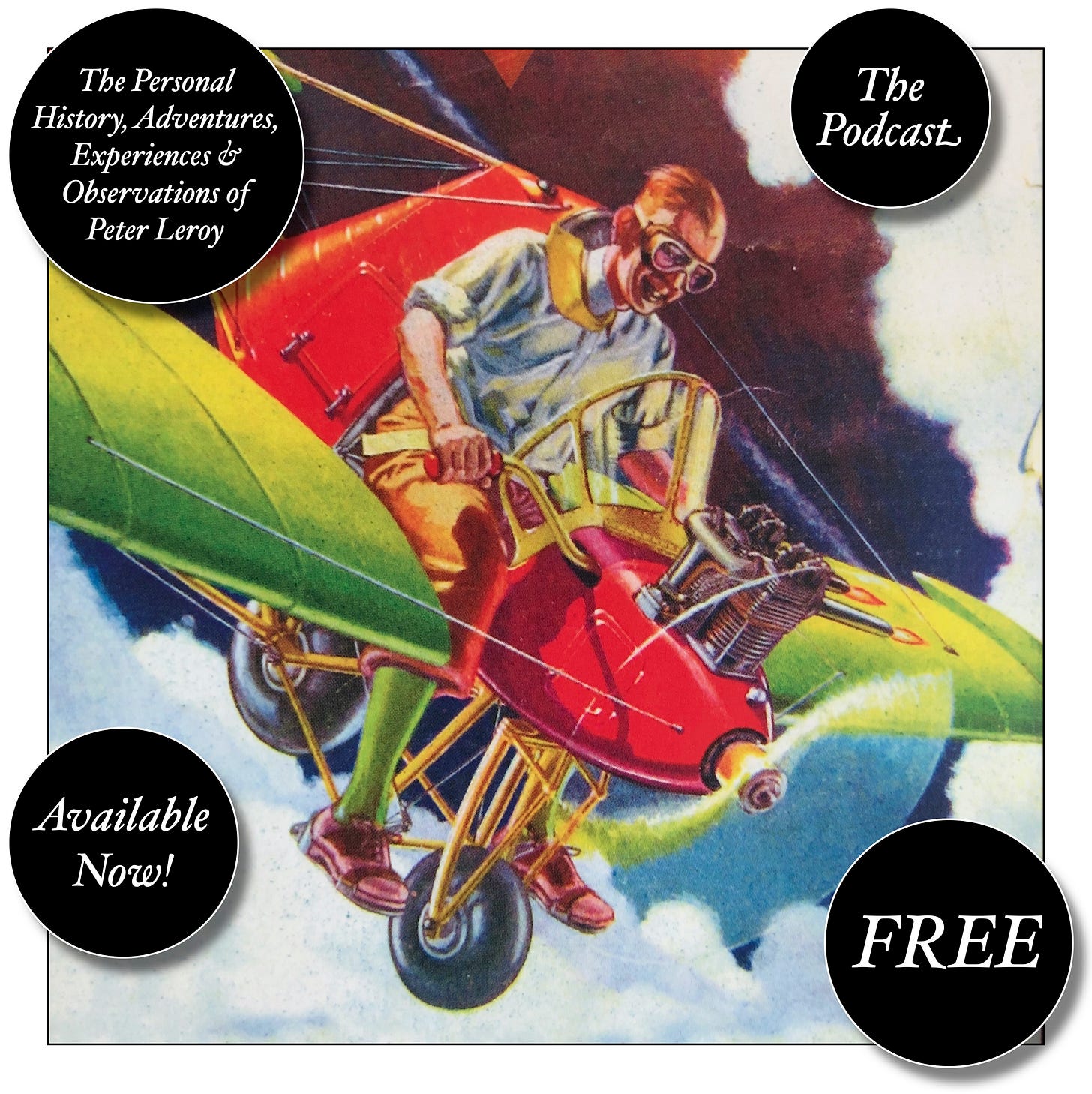


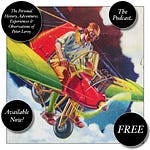



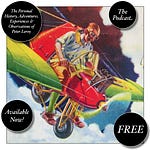
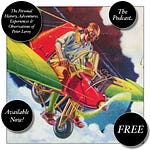
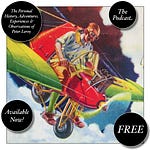
Share this post